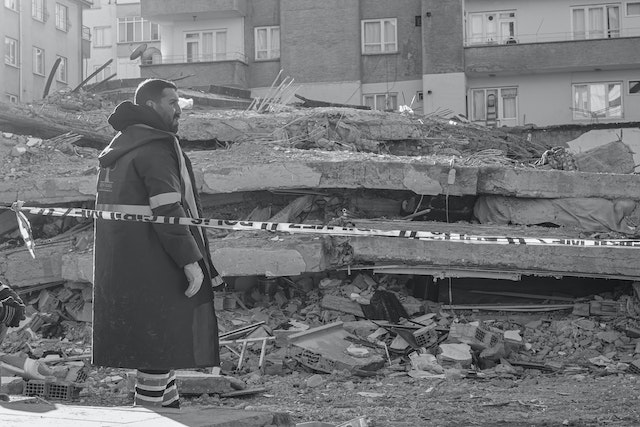The Big One is coming. It’s not a matter of if, but when.
If you live in California, you know what I’m talking about. The San Andreas Fault is constantly shifting, and a major earthquake is inevitable.
That’s why earthquake insurance is so important in California. Homeowners insurance doesn’t cover earthquake damage. This means that without a separate policy, you would be on the hook for the full cost of repairs or rebuilding.
So, should you buy earthquake insurance in California?
The answer is a resounding yes.
Let’s go over the reasons behind this answer and a couple of other vital information about California and earthquake insurance.
Why You Should Buy Earthquake Insurance in California
- The risk of earthquakes is high. California is one of the most earthquake-prone states in the world. In fact, there is a 63% chance of a magnitude 7.0 or greater earthquake occurring in the Los Angeles area in the next 30 years.
- The cost of earthquake damage can be devastating. The average cost of an earthquake repair in California is $35,000. But for homes that are severely damaged, the cost can be much higher. In fact, some homeowners have been forced to rebuild their homes entirely after a major earthquake.
- Earthquake insurance can provide peace of mind. Knowing that you are financially protected in the event of an earthquake can give you peace of mind. This is especially important if you have a family and depend on your home for your livelihood.
Of course, earthquake insurance is not free. But the cost of a policy is typically much lower than the cost of repairing or rebuilding a home after an earthquake.
Is Earthquake Insurance Required in California?
Residents of California are frequently advised to brace themselves for “the big one.” There is currently a greater-than-99% chance of an earthquake of magnitude 6.7 or higher striking California. When it comes to earthquakes, being prepared can mean the difference between your family’s safety and financial security.
Obtaining an earthquake insurance policy could be a proactive method of financial protection. While earthquake insurance is not required in California, earthquake damage is excluded from standard home insurance policies. As a result, if an earthquake damaged your home or personal belongings and you did not have earthquake insurance, you would be responsible for the cost of repairing or replacing damaged belongings out of pocket.
Some earthquake insurance policies cover other structures, such as a pool, shed, or fence. Through loss of use coverage or additional living expenses, earthquake insurance may also cover the cost of temporary living arrangements following a covered quake.
How to Get California Earthquake Insurance
When it comes to obtaining California earthquake insurance, there may be a few options. Here are two of the most common methods by which California residents obtain earthquake insurance:
The California Earthquake Authority (CEA) is one of the largest providers of residential earthquake coverage. It is a non-profit organization, and its premiums reflect the most recent scientific research on earthquake risk in California. The following coverage options are available with a CEA insurance policy:
- Dwelling
- Personal belongings
- Loss of utility
- Building code revisions
- Repairs for emergencies
- Breakables
Many home insurance companies offer CEA earthquake insurance. CEA coverage is currently sold by 24 property insurance companies. Remember that CEA does not sell individual policies. You must have a homeowners insurance policy with one of the participating insurance companies in order to qualify for CEA insurance.
One advantage of CEA insurance is that homeowners can select their own coverage options and deductibles. Breakables and exterior masonry veneer, for example, are optional coverage types. Dwelling coverage is available with deductibles ranging from 5% to 25%.
If you own an older home that has been retrofitted to withstand earthquake damage, you may be eligible for a CEA insurance discount. California homeowners who meet the following criteria may be eligible for a lower premium:
- Was constructed before 1980
- Is built with wood frames
- Is built on a raised foundation or other non-slab foundation that has been seismically retrofitted in accordance with California standards
#2. Earthquake Coverage Through Private Insurers
A standalone policy purchased through a private insurance company is the other option for purchasing earthquake insurance in California. GeoVera, Arrowhead, and Jumpstart are a few private California earthquake insurers. When shopping for earthquake insurance policies, make sure to carefully read each company’s policy coverage and limitations to ensure you understand how you’ll be covered and what your deductibles will be in the event of an earthquake.
What Is the Cost of Earthquake Insurance?
The cost of earthquake insurance may differ for each homeowner. There are a few factors to consider when calculating earthquake insurance costs. The following factors may influence your earthquake insurance premium:
- The age of your residence
- The materials used to construct your home The type of foundation
- The proximity of the house to a fault line
- Costs of reconstruction
- Types of coverage
- Amount deductible
You can use the CEA’s earthquake insurance premium calculator to get an idea of what you’ll pay for coverage. In contrast to conventional home insurance, earthquake insurance rates are typically based on the home’s structure rather than the homeowner. In general, the higher your premium, the higher the risk your home faces.
How to Prepare Your Home for a Natural Disaster
Preparing your home for an earthquake may reduce the likelihood of damage to your home and belongings, as well as better protect your and your family’s safety. Some precautions you should take in case of an earthquake include:
- Secure Furnitures and Electronics: Heavy items, such as furniture, appliances, electronics, hanging objects, and even ceiling fans, should be secured. Keep tall and heavy objects away from areas where you spend a lot of time, such as your living room couch or dining table.
- Properly Store Breakable Objects: If you have breakable objects, such as glassware, consider storing them low or in closed cabinets with latches. Keep heavy objects low to the ground to reduce the risk of injury from falling objects.
- Make a plan for shelter and identify safe spaces. Determine safe places for you and your family to take shelter during an earthquake. Windows, mirrors, and other heavy objects that could break or fall should be avoided. Seek refuge under sturdy furniture, such as a table or desk, if possible. Practicing earthquake drills with your family at home may help you stay calm during a real quake.
Read Also: NEW HOMEOWNERS TAX CREDIT: What It is And The Eligibility
- Inspect your home: You should consider having a professional inspect your home to determine its earthquake readiness. They may recommend strengthening chimneys, retrofitting the foundation, or adding seismic safety measures to an older house.
- Make a plan: Most experts recommend making an earthquake plan with your family. Establish a meeting location and keep a disaster kit on hand. A radio or other device for receiving updates should be included in the kit. Non-perishable food and water, necessary medications, a flashlight, extra batteries, and a first aid kit should also be included.
The steps outlined here are merely general guidelines. The steps required for you may differ depending on your location, home type, and family needs. Local emergency management organizations, as well as national organizations such as the American Red Cross or FEMA, can offer additional advice on how to best prepare for a potential disaster.
What Does Earthquake Insurance Not Cover?
The following are common exclusions from earthquake insurance policies:
- Wells, irrigation systems, sprinkler systems, and water reclamation systems are examples of water supply systems.
- Underground structures or equipment outside the dwelling’s foundation wall, such as underground pipes, cables, flues, and drains
- Bulkheads, piers, wharves, and retaining walls are all examples of structures.
- Masonry veneer, walls, and fences on the exterior
- Antennas and satellite dishes
- Personal belongings kept outside the home
- Awnings and other types of patio covers
- Plants, trees, shrubs, and landscaping
- Data (electronic or physical records such as paper or accounting books)
- Trailers designed to be used in conjunction with a motor vehicle
- Fish, birds, or animals
- Murals, sculptures, fountains, aquariums, stained or leaded glass, mirrors, and chandeliers are examples of decorative items or works of art.
- Spas, swimming pools, and hot tubs
- Automobiles and motorcycles
- Aircraft
- Watercraft
- Property of unrelated tenants, roomers, or boarders
- Any commercial property or property rented out to others
- Personal property in any other dwelling you own, rent, or occupy
Furthermore, a California Earthquake Authority policy will include bulkheads, piers, retaining walls, and masonry fences. However, these structures are only covered if they are essential to the stability of your home.
Remember that you may be able to buy a policy that covers commonly excluded items. For example, we looked at an earthquake insurance policy from American Modern Home Insurance that covered awnings, plaster, masonry chimneys, exterior water supply systems, and underground structures outside the dwelling foundation.
If these kinds of things are important to you, it’s a good idea to compare a few different policies to ensure you get the coverage you need.
Is earthquake insurance required in California?
In California, earthquake insurance is not required by law. Financial institutions do not typically require earthquake insurance as a condition of obtaining a mortgage or lien on your home. Although it is not required, comparing the cost of earthquake insurance to the potential risk of earthquake damage in your area may help you decide whether a policy is worthwhile for you.
What is the best earthquake insurance in California?
The best earthquake insurance in California is determined by your specific situation, such as the location and structure of your home, your financial situation, and your risk tolerance. Investigating coverage options and receiving personalized quotes from the CEA and private insurers may assist you in determining the best coverage for your home.
How much earthquake coverage do I require?
Every homeowner may require a different amount of earthquake coverage. When determining your coverage limits, most insurance experts recommend taking into account factors such as the age of your home, the materials used to construct it, its proximity to a fault line, and the type of foundation. Speaking with a licensed insurance agent may provide you with additional guidance on the best earthquake insurance in California.
Is earthquake insurance required in San Francisco?
While earthquake insurance is not required in California, it is recommended if you live in a high-risk area such as San Francisco. The city is located near several major geologic faults, increasing the likelihood of an earthquake. However, the characteristics of your home, your budget, and your risk tolerance may all influence your coverage requirements. Finally, the decision is yours, but you may want to consult with an insurance agent who can advise you on your specific needs.
- HOMEOWNERS INSURANCE: Companies, Quotes, and Buying Guide
- 9+ Best Earthquake Insurance Companies 2023 (Updated)
- How Much for Earthquake Insurance 2023 (Updated)
- Earthquake Insurance 2023: Is it Worth it?






